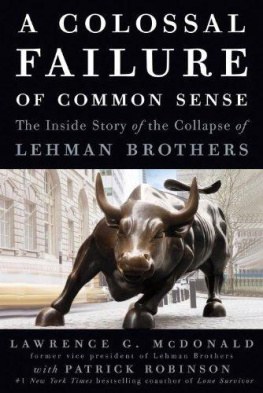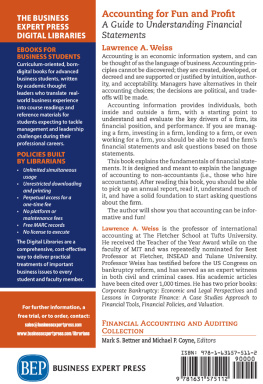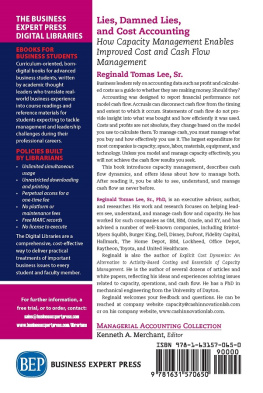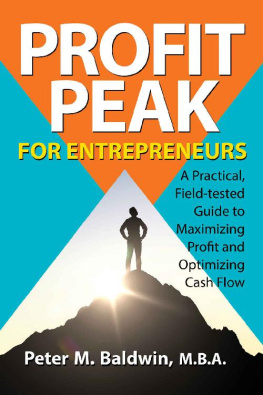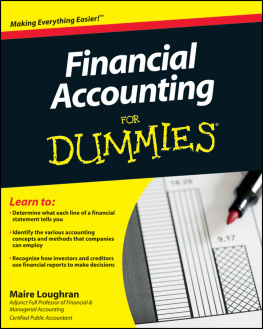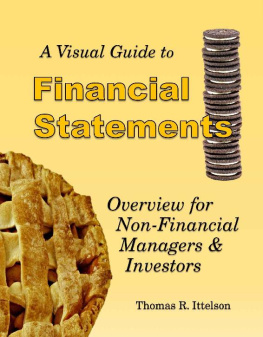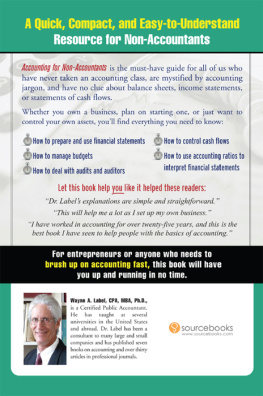The Laymans Guide to Understanding Financial Statements
How to Read, Analyze, Create & Understand Balance Sheets, Income Statements, Cash Flow & More
By
Simon J. Lawrence
Copyrighted Material
Copyright 2020 Lost River Publishing House
Email: Publisher@LostRiver.pub
All Rights Reserved.
No part of this publication may be reproduced, stored in a retrieval system or transmitted in any form or by any means, electronic, mechanical, photocopying, recording or otherwise without the proper written consent of the copyright holder, except as permitted under Sections 107 & 108 of the 1976 United States Copyright Act, without the prior written permission of the publisher.
Lost River Publishing House publishes its books and guides in a variety of electronic and print formats, Some content that appears in print may not be available in electronic format, and vice versa.
Cover design
Lisa Cunningham
First Edition
Contents
Introduction
When I started my first business, I had no idea that I would have to interpret financial statements or even prepare them. However, it was not long before the bills started piling up. I found myself mixing my revenue with my personal finances, and I couldn't track my profits. It was at this point that I realized I needed to invest in financial management. I hired a bookkeeper with the hope of getting everything sorted out. In less than three months, I realized that my bookkeeper was keeping my money instead of the books. Long story short, I learned a valuable lesson from my initial mistakes in business.
No matter how well your business is operating, you must be able to manage your finances if you want it to have a future. I did not have to attend accounting school; however, I have learned how to manage my accounts books, process taxes, and payroll, among others.
For any person getting into business, financial management is an area of interest. If you are a manager or a business owner, your main duty is to monitor the flow of finances, plan for the daily operations of the business, and invest in the future of the business. You cannot achieve any of these objectives unless you can interpret your financial statements and maintain your books of accounts well. If you are not able to read and interpret your financial statements, most of the accountants you hire may take advantage of the situation to mismanage the funds.
In this book, I will be helping you learn how to keep your books, prepare financial statements, and interpret them. These are the key areas of accounting that you must pay attention to if you wish to manage your finances. The main area of concern for most accountants is interpreting financial statements. In this book, we will be helping you learn how to interpret your financial statements and make the best out of them.
To ensure that you gain the most from this book, I have broken it into sections that are simple to understand. Each section builds up from the known towards the unknown. In the first section of the book, we start by introducing you to the general bookkeeping and accounting principles. Given that this book is based on the American accounting system, it will help you learn what you need to know when managing your business in the US. In the introductory section, we help you understand the importance of accounting and the reason why you need to invest in accounting.
In the second section of the book, we introduce you to the more technical aspects of accounting, in the most simplified way. When I started my first business, I tried reading many accounting books, but I could not understand anything. From my personal experience, I have made it my mission to make accounting as simple as possible. In this section, I will introduce you to financial statements in the most simplistic way possible. You do not have to be an accountant to understand or prepare financial statements. I will help you prepare all the major financial statements from scratch. I will show you short cut methods that you can use to verify the figures being provided by your accountants and the best ways to ensure that your finances are adding up.
In the third section of the book, we focus on interpreting and benefiting the most from financial statements. Probably, you do not want to prepare financial statements, but you wish to interpret them. In this section, I will break it down to you in the simplest way possible. As long as you can account for your personal finances, managing, and accounting for your business, finances will not be a problem. I will help you learn how to track down your expenses, revenue, assets, capital, and the growth of your business.
In the fourth section of the book, we look at some of the common errors that individuals make in day to day accounting. If you are not an accounting expert, you might end up making mistakes that are costly. We are going to look at some of the mistakes that you must avoid. If you are hiring accountants, we will help you know the questions to ask and the approach to take to ensure that there is transparency.
If you are a business owner, a manager, or an aspiring business owner, this book is for you. This is not an accounting educational paper, but rather a guide that simplifies accounting to the average person. Even if you did not attend formal school, this book will help you manage the finances of your business, seal all possible loopholes, and ensure that your business grows.
Throughout this book, we have used examples, illustrations, and diagrams that will help simplify your work. By reading through the book once, you should be able to handle basic bookkeeping and accounting tasks. Welcome aboard, and enjoy your reading.
Chapter 1: Accounting and Bookkeeping Principles

Accounting is a broad subject that you cannot master in a few days. However, you can master the basics of accounting and be able to start taking care of your business accounts in just a week. The aim of this book is not to make you a professional accountant but rather, to help you manage your accounts without necessarily depending on anyone. To be able to become an accountant in such a short period of time, you will have to focus on the key principles of the subject. In this chapter, I am going to introduce you to the key principles of accounting and bookkeeping. I will help you understand what accounting really is, how different it is from bookkeeping, and how to manage your books, among other factors. However, before we even start looking at what accounting is, we should define some of the terms that are commonly used by accountants. You will encounter most of these terms throughout the book. It is in your best interest to keep them at the back of your mind so as to make your understanding of the book much easier.
Defining Terminology
Accounts Receivable (AR): The accounts receivable is an entry in the books of accounts that represents the money or assets owned by customers or clients. Think of accounts receivable as money that belongs to the business but is currently in the hands of another party.
Accounting (ACCG): The abbreviation ACCG is used to refer to accounting, which stands for a systematic way of recording and reporting financial transactions of a business entity. The term accounting is only used for established businesses that can sue or be sued.






